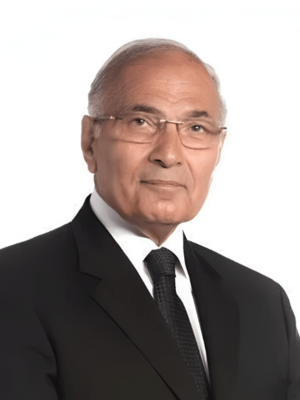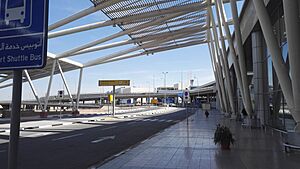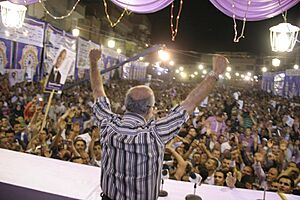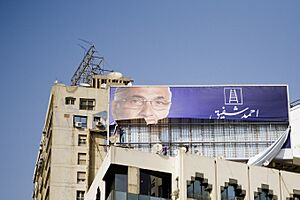Ahmed Shafik facts for kids
Quick facts for kids
Air Marshal
Ahmed Shafik
|
|
|---|---|
|
أحمد شفيق
|
|

Shafik in 2012
|
|
| Prime Minister of Egypt | |
| In office 29 January 2011 – 3 March 2011 |
|
| President |
|
| Preceded by | Ahmed Nazif |
| Succeeded by | Essam Sharaf |
| Minister of Civil Aviation | |
| In office 18 September 2002 – 28 January 2011 |
|
| Prime Minister | |
| Preceded by | Ahmed Abdel Rahman Nasser |
| Succeeded by | Ibrahim Manaa |
| Commander of the Air Force | |
| In office 7 April 1996 – 1 March 2002 |
|
| President | Hosni Mubarak |
| Preceded by | Ahmed Abdel Rahman Nasser |
| Succeeded by | Magdy Galal Sharawi |
| Personal details | |
| Born |
Ahmed Mohamed Shafik Zaki
25 November 1941 Cairo, Kingdom of Egypt |
| Political party | Egyptian National Movement (December 2012 - Present) |
| Spouse | Azza Tawfiq |
| Children | 3 |
| Awards | Medal of Military Duty |
| Military service | |
| Allegiance | Egypt |
| Branch/service | |
| Years of service | 1961–2002 |
| Rank | |
| Battles/wars |
|
Air Marshal Ahmed Mohamed Shafik Zaki is an Egyptian politician and a former presidential candidate. He was a high-ranking officer in the Egyptian Air Force. Later, he served as the Prime Minister of Egypt for a short time in 2011.
Shafik had a long career as a fighter pilot. He commanded squadrons, wings, and groups. From 1996 to 2002, he was the Commander of the Egyptian Air Force. He reached the high rank of air marshal. After his military career, he became the Minister of Civil Aviation from 2002 to 2011.
In January 2011, President Hosni Mubarak chose him to be prime minister. This happened during the 2011 Egyptian Revolution. Shafik was the last prime minister under Mubarak's rule. He resigned in March 2011 after about a month in office.
He ran for president in the 2012 Egyptian presidential election. He lost by a small number of votes to Mohamed Morsi.
Contents
Early Life and School
Shafik was born in Heliopolis, a part of Cairo, on 25 November 1941. His parents were well-known in Egyptian society. His father worked for the government in irrigation. His mother was the daughter of a famous eye doctor.
After finishing high school, he joined the Egyptian Air Academy. He graduated in 1962 when he was 21. He then became a member of the Egyptian Air Force (EAF). Later, he earned several advanced degrees. These included a master's degree in military science and fellowships from military colleges. He also earned a PhD related to national strategy in space.
Military Career
As a young officer, Shafik flew Mig-19 and Mig-21 fighter jets. He later became a fighter air squadron commander. During the War of Attrition (1967–1970), he was active as a Multi-Task Airwing Commander. After that, he became an air base commander.
During the 1973 October War, Shafik was a senior fighter pilot. He served under Hosni Mubarak's command. Shafik shot down two Israeli aircraft during the war on 14 October 1973.
Over 40 years in the Egyptian Air Force, he flew many types of fighter jets. These included the Mikoyan-Gurevich MiG-17, MiG-19, MiG-21, and the Dassault Mirage 2000. He also led the Egyptian Air Force acrobatic team. He was also trained to fly American-built jets like the McDonnell Douglas F-4 Phantom II and the General Dynamics F-16 Fighting Falcon.
In 1984, Shafik became a military representative in the Egyptian Embassy in Rome. He stayed in this role until 1986. In 1986, he was promoted to Air Commodore. He became the commander of a Group and a Mig-21 Airbase. From 1988 to 1991, Shafik held several senior military command jobs. He then became the Commander of the Air Operations Department.
In September 1991, Shafik was made the Air Force's chief of staff. He held this position until April 1996. Then, he became the Commander of the Egyptian Air Force. In 2002, he left military service. His chief of staff, Air Marshal Magdy Galal Sharawi, took over his role.
Political Career
After leaving the Air Force, Shafik became the Minister of Civil Aviation. This was on 18 September 2002, shortly after the Ministry was created. As minister, he worked to improve EgyptAir. He also helped build a new third terminal at Cairo International Airport. This terminal was finished in 2008 and opened in 2009. He continued as minister until he became Prime Minister of Egypt on 29 January 2011.
During the Egyptian Revolution of 2011, President Hosni Mubarak appointed Shafik as prime minister. Shafik's time as prime minister was short, lasting just over a month. He resigned on 3 March 2011 due to pressure from protesters. They felt he was too closely linked to Mubarak's government. Essam Sharaf became prime minister after Shafik stepped down.
Shafik resigned after a TV interview where he was questioned by Alaa Al Aswany, a well-known Egyptian writer. Al Aswany strongly criticized Shafik during the show. This was one of the first times a high-ranking government official was publicly criticized on TV in Egypt.
On 10 July 2011, Shafik made his first public appearance since resigning. He attended a graduation ceremony for the Egyptian Air Force Academy.
2012 Egyptian Presidential Election
In November 2011, Shafik announced he would run in the 2012 Egyptian presidential election. His decision caused some debate and protests in Egypt. Many people saw him as a reminder of the Mubarak era. Shafik's comment that he saw former president Hosni Mubarak as a "role model" was especially controversial.
Shafik was one of two candidates who made it to the second round of voting. The other was Mohamed Morsi from the Freedom and Justice Party. The final round of voting took place on 16–17 June 2012.
On 28 May 2012, protesters who were upset about Shafik reaching the second round set fire to one of his campaign offices in Cairo. The election between Shafik and Morsi was seen as a choice between two very different politicians.
Shafik's campaign focused on bringing back order and security to the country. He suggested he would use strong measures to restore peace within a month if he became president.
Preliminary results showed that Mohamed Morsi won the second round of elections. However, Shafik also claimed victory at first.
On 24 June, the official election results were announced. Shafik narrowly lost to Morsi. Morsi received 51.73% of the votes, while Shafik received 48.27%.
After his defeat, Shafik and his family traveled to Abu Dhabi. He later confirmed this on Sky News.
New Political Party
Ahmed Shafik announced that he would start a new political party. It is called the Egyptian National Movement. This announcement was made on 24 September 2012.
2018 Egyptian Presidential Election
On 29 November 2017, Ahmed Shafik said he planned to run in the 2018 Egyptian presidential election. A few hours later, he stated that he was prevented from leaving the United Arab Emirates. However, a UAE minister denied this, saying there was "no obstacle" for Shafik to leave. On 2 December 2017, Shafik was sent from the UAE to France. The next day, he arrived in Egypt.
On 7 January 2018, Ahmed Shafik withdrew his candidacy. He announced he would not run in the presidential race.
See also
 In Spanish: Ahmed Shafik para niños
In Spanish: Ahmed Shafik para niños
 | Selma Burke |
 | Pauline Powell Burns |
 | Frederick J. Brown |
 | Robert Blackburn |




